HA2022 Business Law Assignment: Contract and Civil Liability Scenarios
VerifiedAdded on 2023/04/25
|12
|894
|375
Case Study
AI Summary
This assignment presents a case study analyzing two distinct legal scenarios. The first scenario involves Jones, who sustained injuries in Smith's Parking. The analysis focuses on whether Smith's Parking can avoid liability using an exclusion clause, referencing relevant case law such as Olley v Marlborough Court and Thornton v Shoe Lane Parking Ltd. It concludes that the exclusion clause is unlikely to be valid. The second scenario examines John's contract with Brown Suppliers Pty Ltd, focusing on potential violations of the Australian Consumer Law (ACL) due to unconscionable conduct and excessive surcharges. The analysis references the Competition and Consumer Act 2010 and the case of Commercial Bank of Australia Ltd v Amadio, determining that John's rights were likely breached and he can claim remedies under the ACL.

Business Law
Paraphrase This Document
Need a fresh take? Get an instant paraphrase of this document with our AI Paraphraser
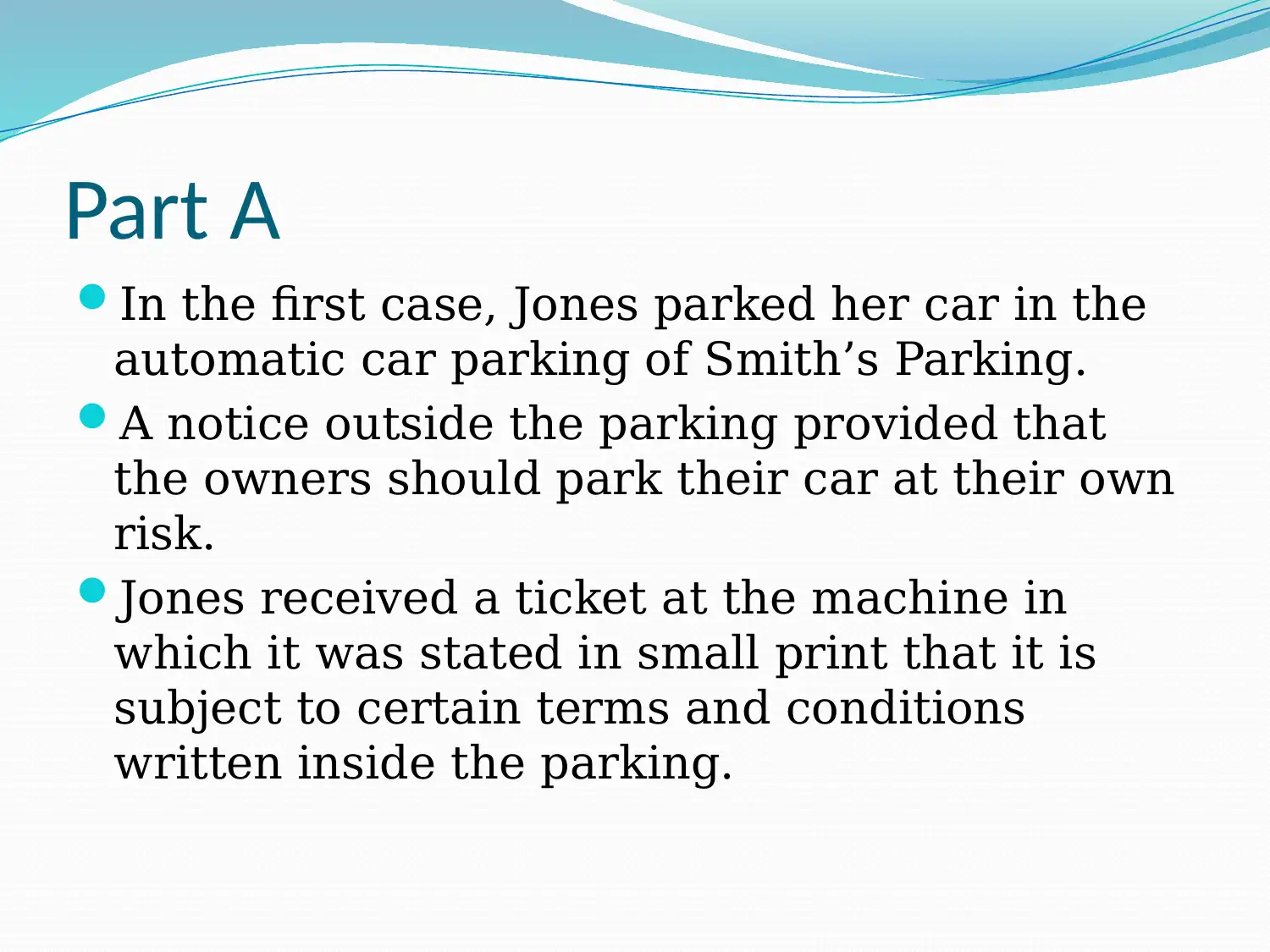
Part A
In the first case, Jones parked her car in the
automatic car parking of Smith’s Parking.
A notice outside the parking provided that
the owners should park their car at their own
risk.
Jones received a ticket at the machine in
which it was stated in small print that it is
subject to certain terms and conditions
written inside the parking.
In the first case, Jones parked her car in the
automatic car parking of Smith’s Parking.
A notice outside the parking provided that
the owners should park their car at their own
risk.
Jones received a ticket at the machine in
which it was stated in small print that it is
subject to certain terms and conditions
written inside the parking.
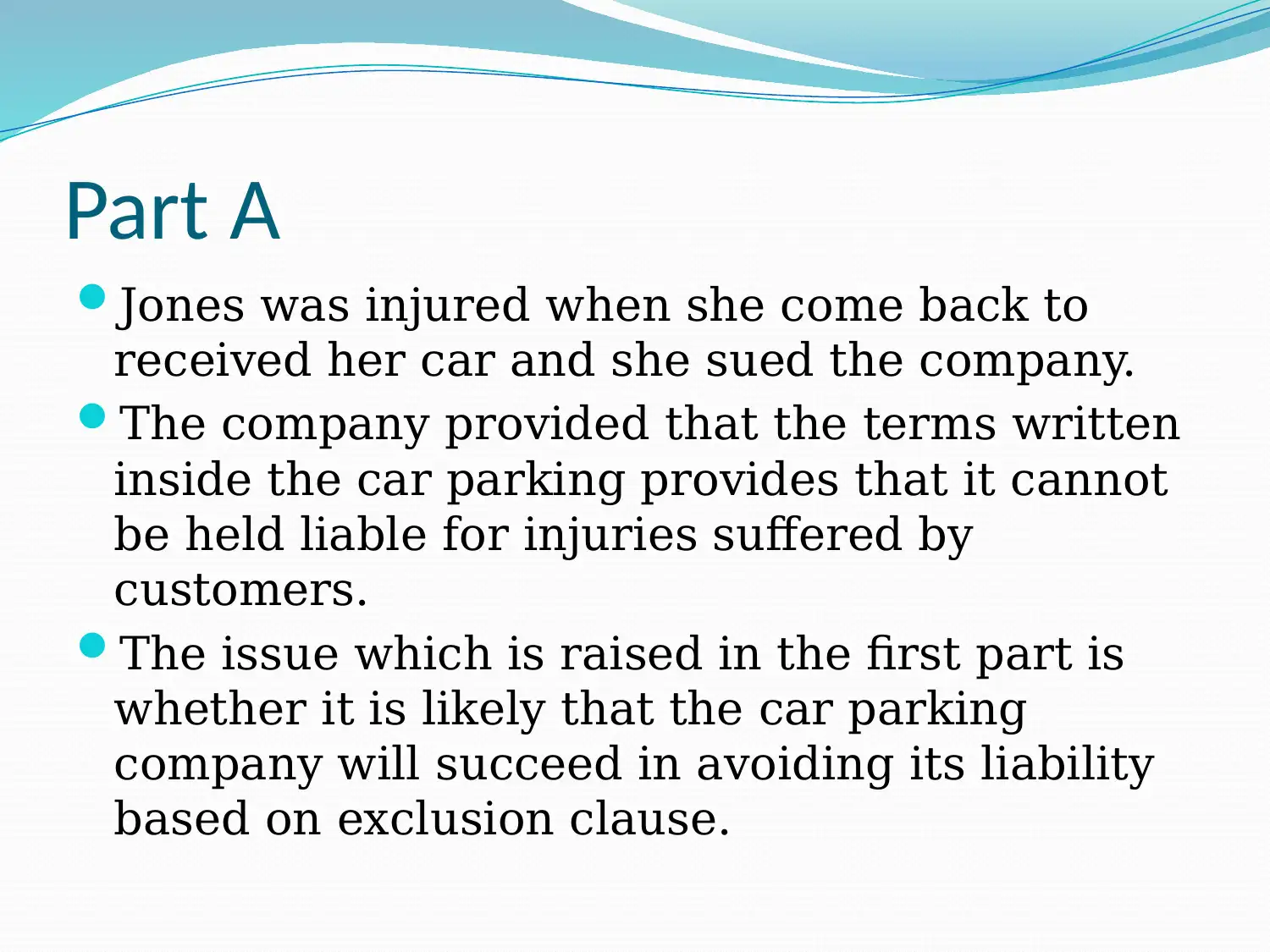
Part A
Jones was injured when she come back to
received her car and she sued the company.
The company provided that the terms written
inside the car parking provides that it cannot
be held liable for injuries suffered by
customers.
The issue which is raised in the first part is
whether it is likely that the car parking
company will succeed in avoiding its liability
based on exclusion clause.
Jones was injured when she come back to
received her car and she sued the company.
The company provided that the terms written
inside the car parking provides that it cannot
be held liable for injuries suffered by
customers.
The issue which is raised in the first part is
whether it is likely that the car parking
company will succeed in avoiding its liability
based on exclusion clause.
⊘ This is a preview!⊘
Do you want full access?
Subscribe today to unlock all pages.

Trusted by 1+ million students worldwide
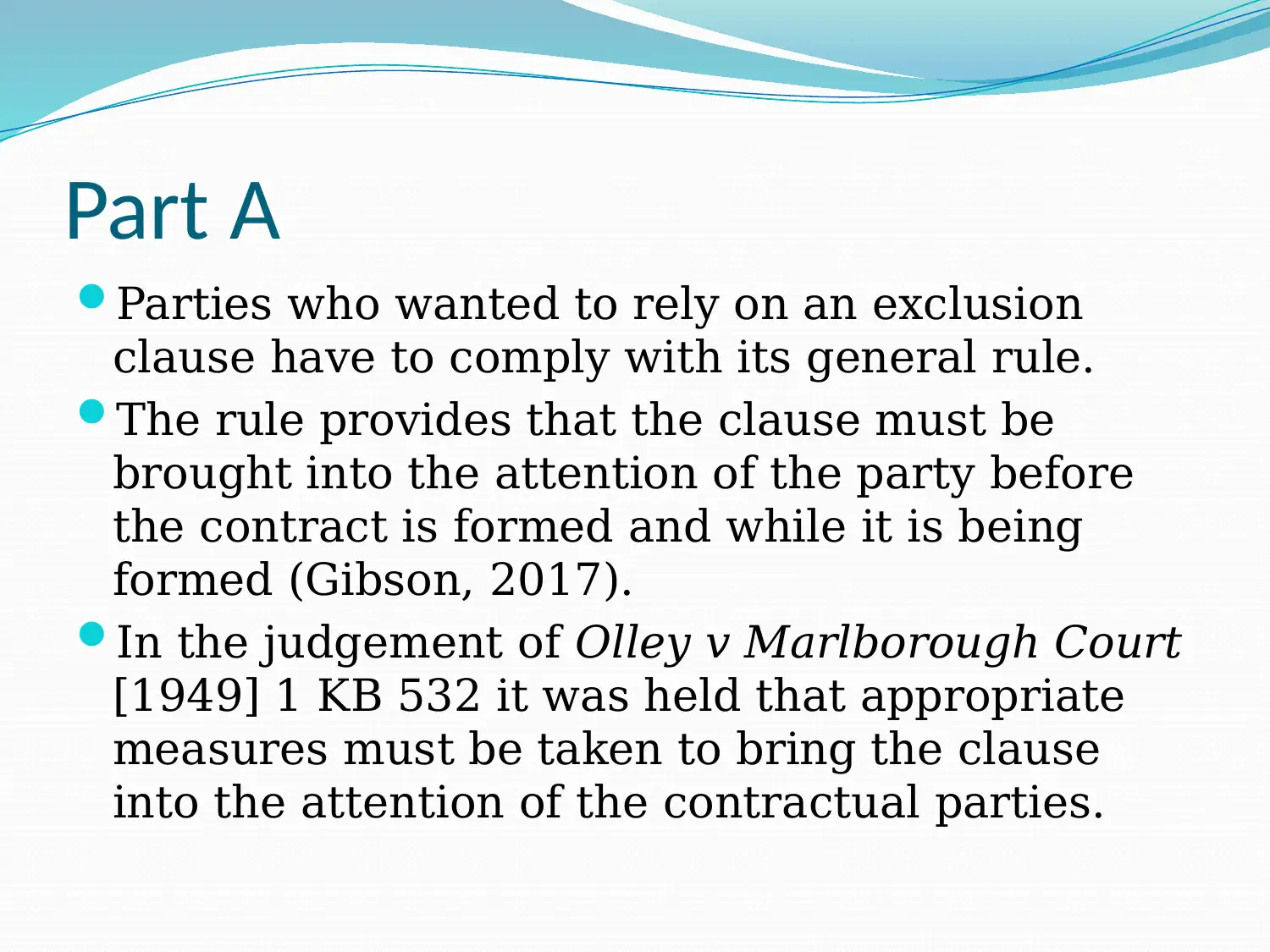
Part A
Parties who wanted to rely on an exclusion
clause have to comply with its general rule.
The rule provides that the clause must be
brought into the attention of the party before
the contract is formed and while it is being
formed (Gibson, 2017).
In the judgement of Olley v Marlborough Court
[1949] 1 KB 532 it was held that appropriate
measures must be taken to bring the clause
into the attention of the contractual parties.
Parties who wanted to rely on an exclusion
clause have to comply with its general rule.
The rule provides that the clause must be
brought into the attention of the party before
the contract is formed and while it is being
formed (Gibson, 2017).
In the judgement of Olley v Marlborough Court
[1949] 1 KB 532 it was held that appropriate
measures must be taken to bring the clause
into the attention of the contractual parties.
Paraphrase This Document
Need a fresh take? Get an instant paraphrase of this document with our AI Paraphraser
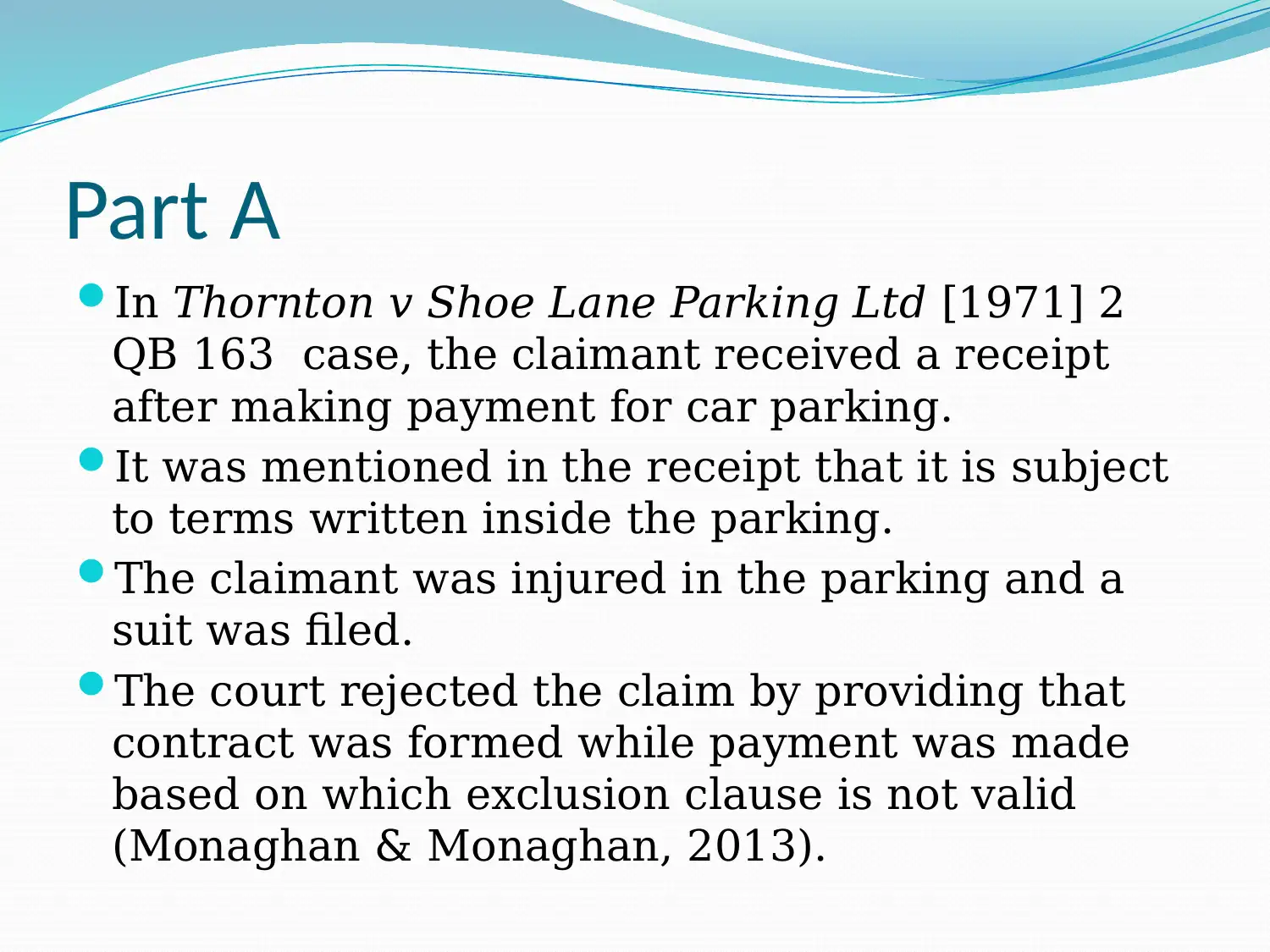
Part A
In Thornton v Shoe Lane Parking Ltd [1971] 2
QB 163 case, the claimant received a receipt
after making payment for car parking.
It was mentioned in the receipt that it is subject
to terms written inside the parking.
The claimant was injured in the parking and a
suit was filed.
The court rejected the claim by providing that
contract was formed while payment was made
based on which exclusion clause is not valid
(Monaghan & Monaghan, 2013).
In Thornton v Shoe Lane Parking Ltd [1971] 2
QB 163 case, the claimant received a receipt
after making payment for car parking.
It was mentioned in the receipt that it is subject
to terms written inside the parking.
The claimant was injured in the parking and a
suit was filed.
The court rejected the claim by providing that
contract was formed while payment was made
based on which exclusion clause is not valid
(Monaghan & Monaghan, 2013).
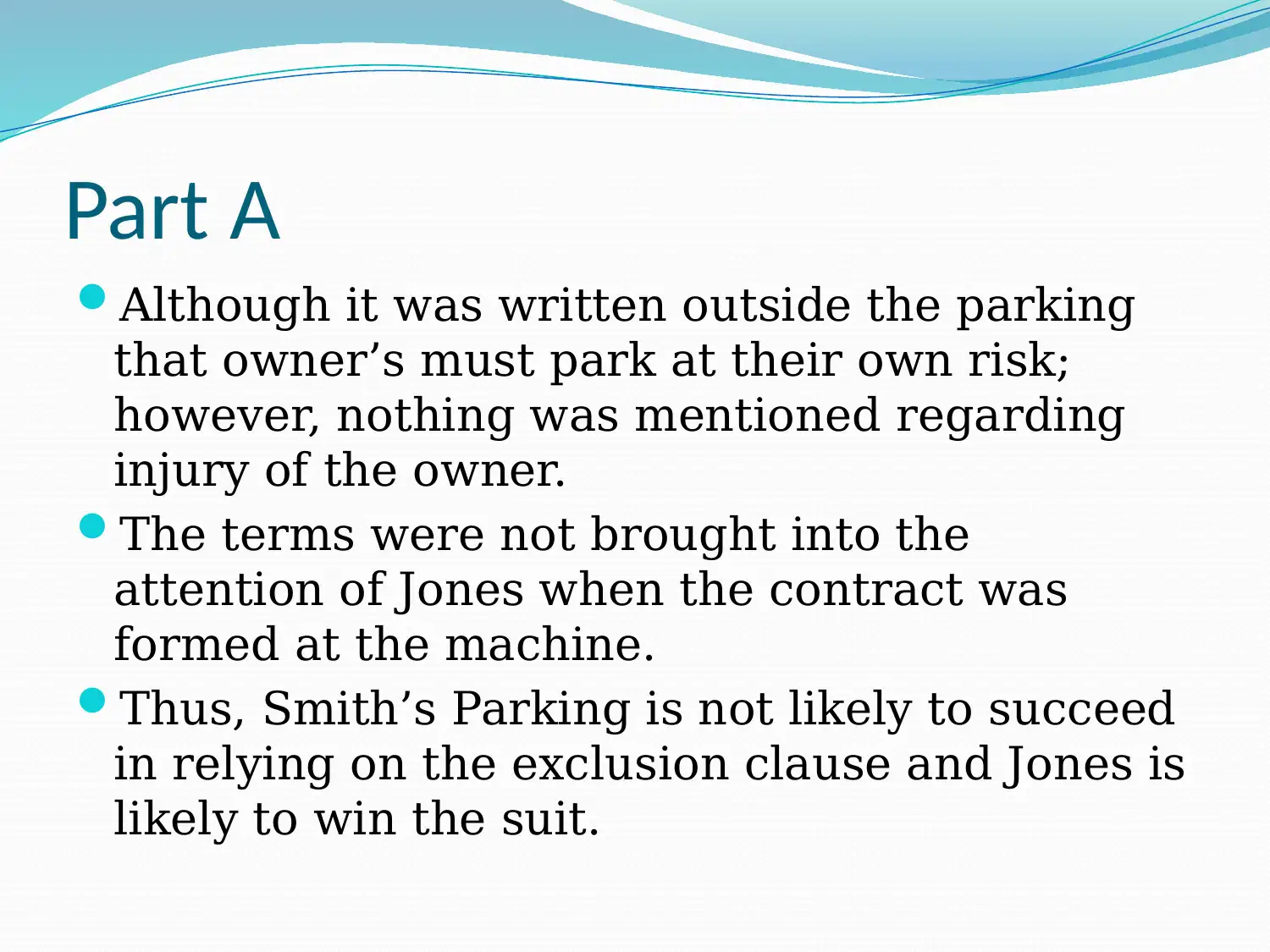
Part A
Although it was written outside the parking
that owner’s must park at their own risk;
however, nothing was mentioned regarding
injury of the owner.
The terms were not brought into the
attention of Jones when the contract was
formed at the machine.
Thus, Smith’s Parking is not likely to succeed
in relying on the exclusion clause and Jones is
likely to win the suit.
Although it was written outside the parking
that owner’s must park at their own risk;
however, nothing was mentioned regarding
injury of the owner.
The terms were not brought into the
attention of Jones when the contract was
formed at the machine.
Thus, Smith’s Parking is not likely to succeed
in relying on the exclusion clause and Jones is
likely to win the suit.
⊘ This is a preview!⊘
Do you want full access?
Subscribe today to unlock all pages.

Trusted by 1+ million students worldwide
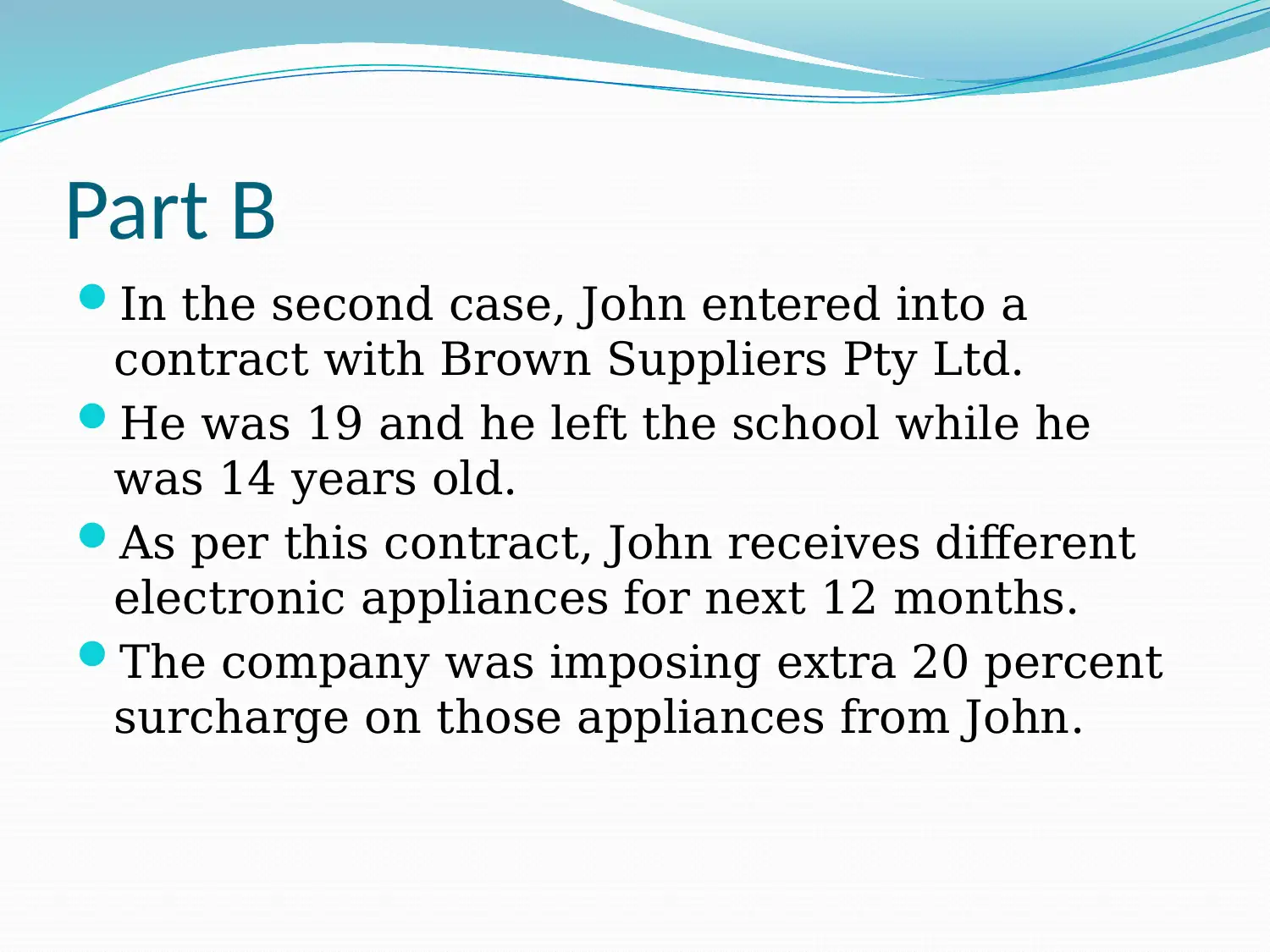
Part B
In the second case, John entered into a
contract with Brown Suppliers Pty Ltd.
He was 19 and he left the school while he
was 14 years old.
As per this contract, John receives different
electronic appliances for next 12 months.
The company was imposing extra 20 percent
surcharge on those appliances from John.
In the second case, John entered into a
contract with Brown Suppliers Pty Ltd.
He was 19 and he left the school while he
was 14 years old.
As per this contract, John receives different
electronic appliances for next 12 months.
The company was imposing extra 20 percent
surcharge on those appliances from John.
Paraphrase This Document
Need a fresh take? Get an instant paraphrase of this document with our AI Paraphraser
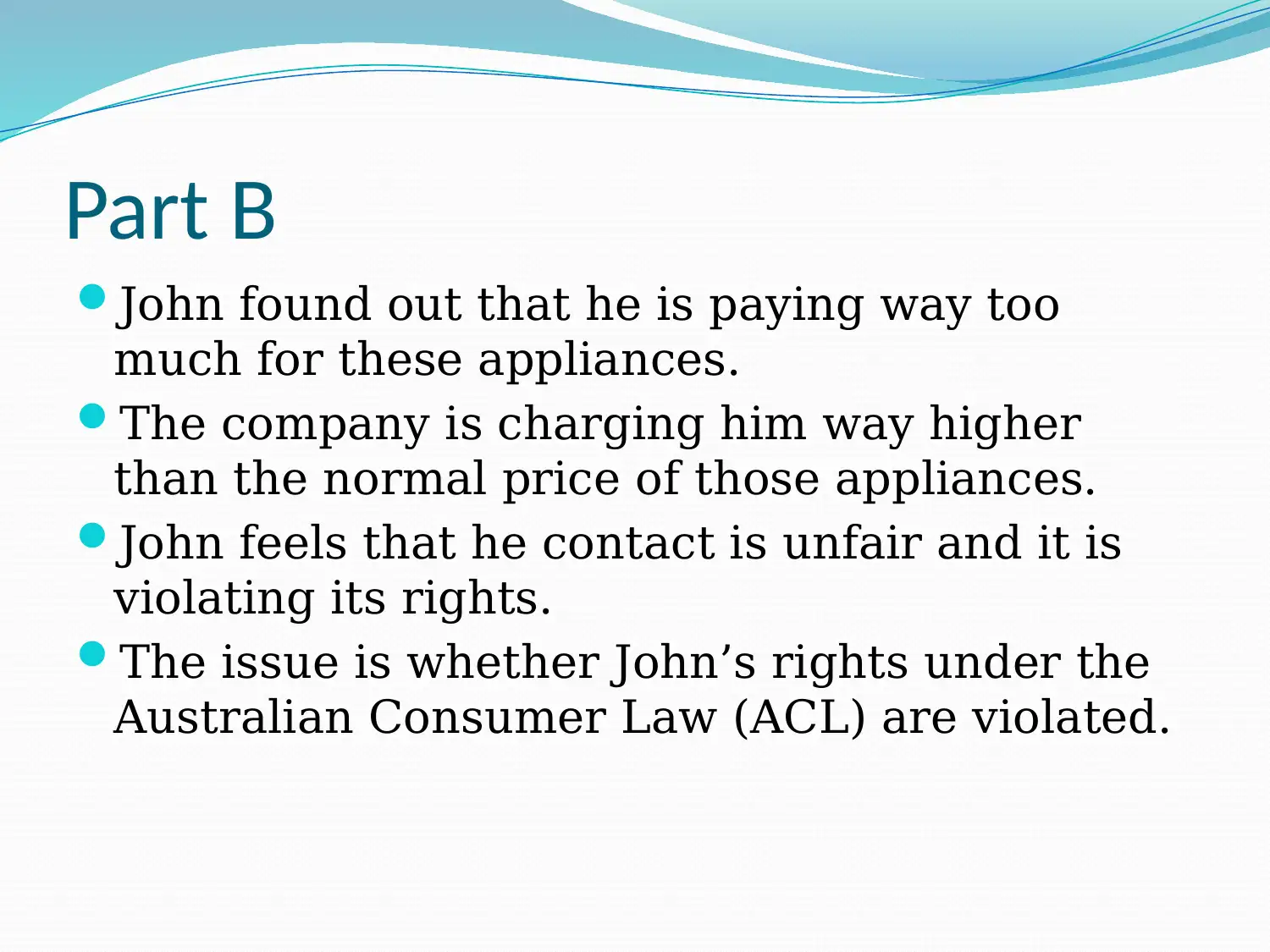
Part B
John found out that he is paying way too
much for these appliances.
The company is charging him way higher
than the normal price of those appliances.
John feels that he contact is unfair and it is
violating its rights.
The issue is whether John’s rights under the
Australian Consumer Law (ACL) are violated.
John found out that he is paying way too
much for these appliances.
The company is charging him way higher
than the normal price of those appliances.
John feels that he contact is unfair and it is
violating its rights.
The issue is whether John’s rights under the
Australian Consumer Law (ACL) are violated.
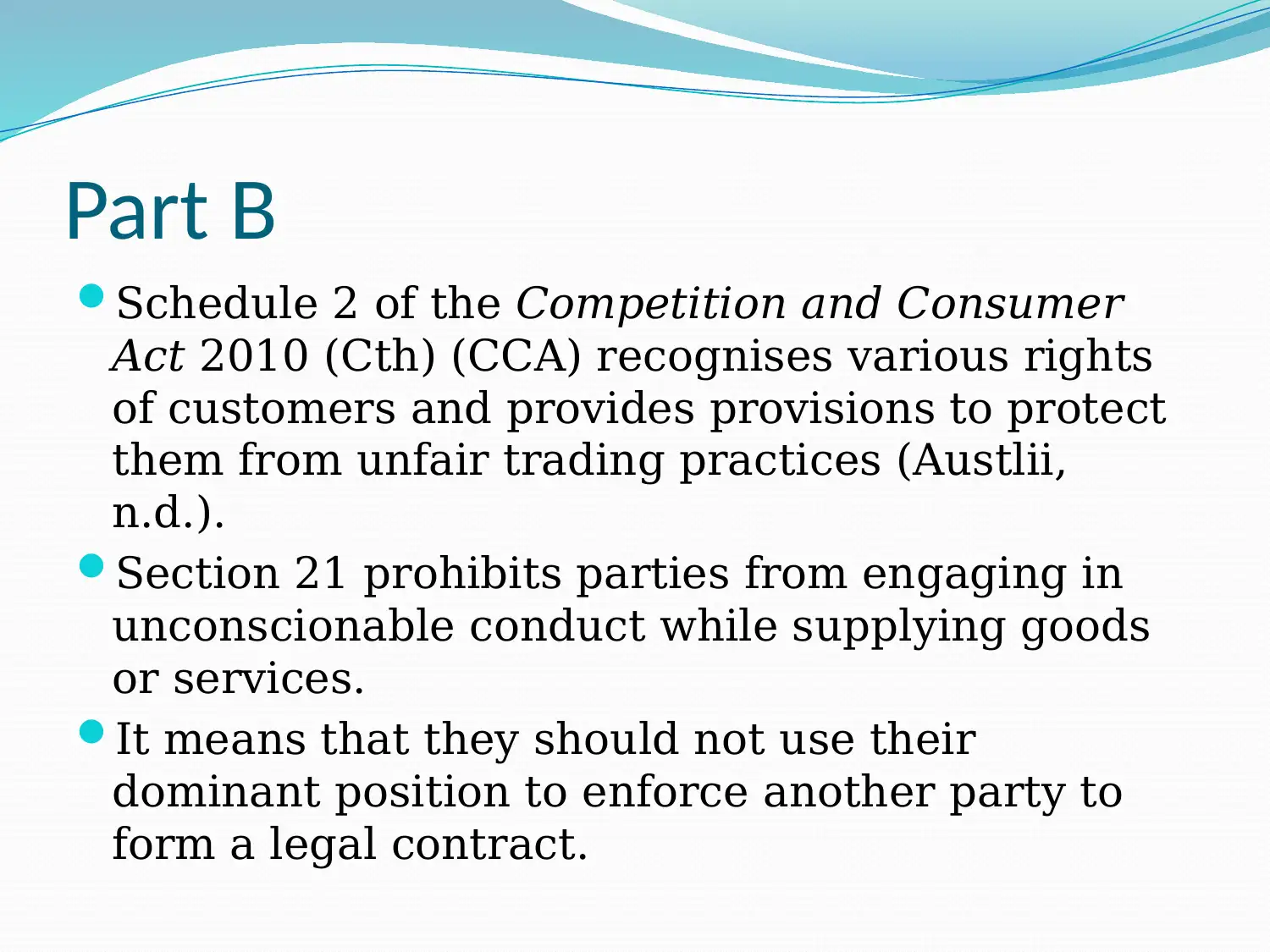
Part B
Schedule 2 of the Competition and Consumer
Act 2010 (Cth) (CCA) recognises various rights
of customers and provides provisions to protect
them from unfair trading practices (Austlii,
n.d.).
Section 21 prohibits parties from engaging in
unconscionable conduct while supplying goods
or services.
It means that they should not use their
dominant position to enforce another party to
form a legal contract.
Schedule 2 of the Competition and Consumer
Act 2010 (Cth) (CCA) recognises various rights
of customers and provides provisions to protect
them from unfair trading practices (Austlii,
n.d.).
Section 21 prohibits parties from engaging in
unconscionable conduct while supplying goods
or services.
It means that they should not use their
dominant position to enforce another party to
form a legal contract.
⊘ This is a preview!⊘
Do you want full access?
Subscribe today to unlock all pages.

Trusted by 1+ million students worldwide
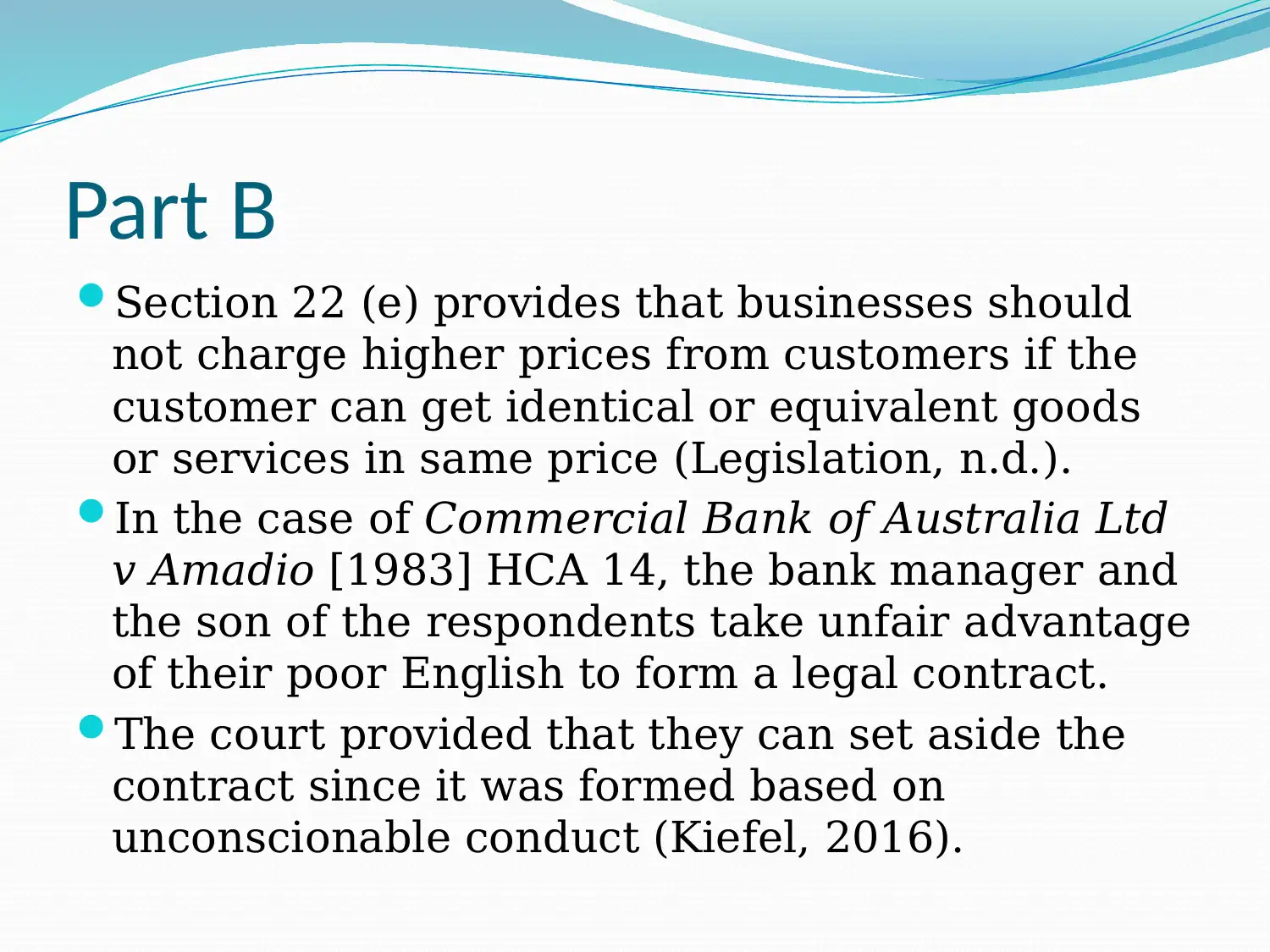
Part B
Section 22 (e) provides that businesses should
not charge higher prices from customers if the
customer can get identical or equivalent goods
or services in same price (Legislation, n.d.).
In the case of Commercial Bank of Australia Ltd
v Amadio [1983] HCA 14, the bank manager and
the son of the respondents take unfair advantage
of their poor English to form a legal contract.
The court provided that they can set aside the
contract since it was formed based on
unconscionable conduct (Kiefel, 2016).
Section 22 (e) provides that businesses should
not charge higher prices from customers if the
customer can get identical or equivalent goods
or services in same price (Legislation, n.d.).
In the case of Commercial Bank of Australia Ltd
v Amadio [1983] HCA 14, the bank manager and
the son of the respondents take unfair advantage
of their poor English to form a legal contract.
The court provided that they can set aside the
contract since it was formed based on
unconscionable conduct (Kiefel, 2016).
Paraphrase This Document
Need a fresh take? Get an instant paraphrase of this document with our AI Paraphraser
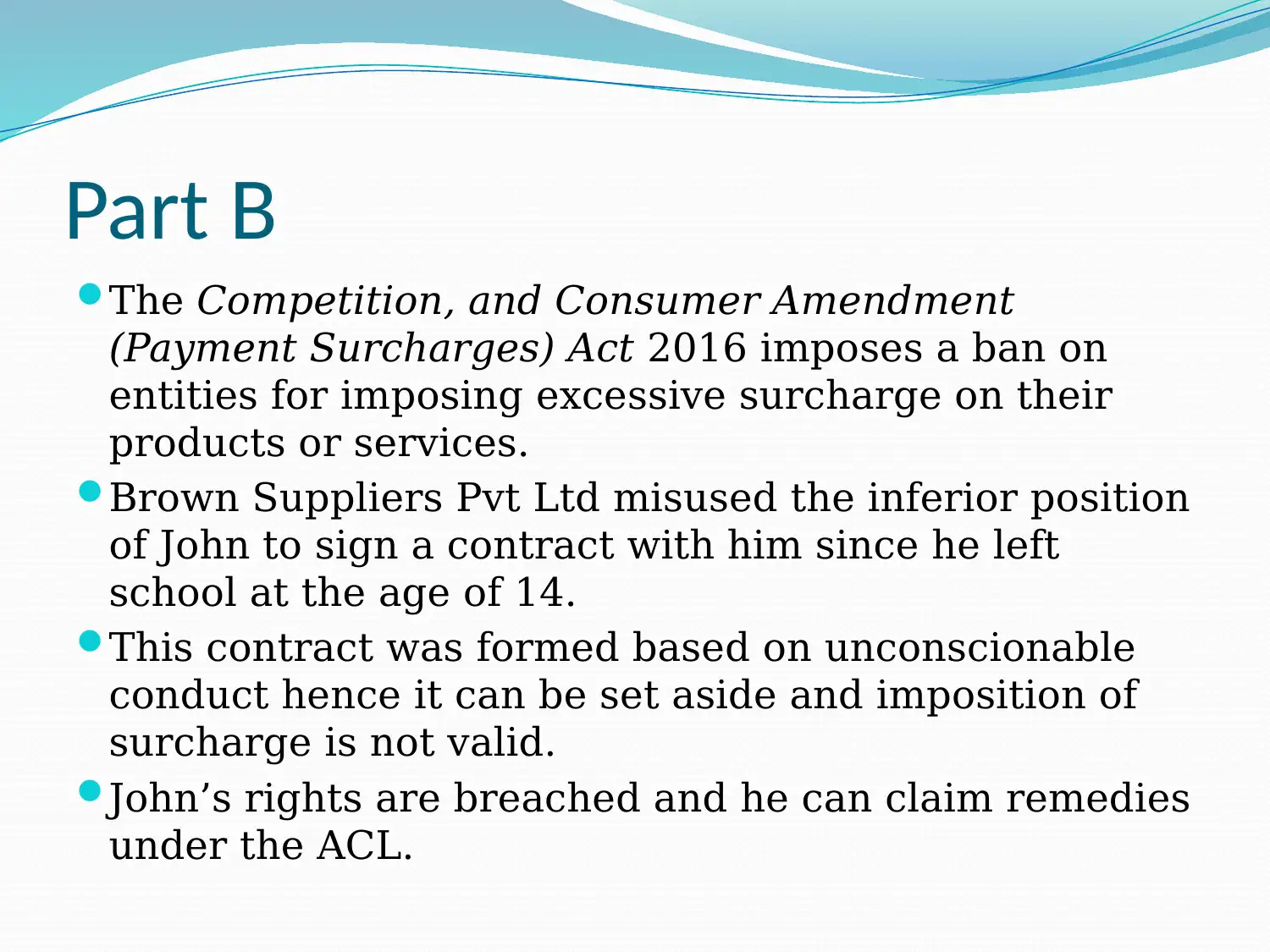
Part B
The Competition, and Consumer Amendment
(Payment Surcharges) Act 2016 imposes a ban on
entities for imposing excessive surcharge on their
products or services.
Brown Suppliers Pvt Ltd misused the inferior position
of John to sign a contract with him since he left
school at the age of 14.
This contract was formed based on unconscionable
conduct hence it can be set aside and imposition of
surcharge is not valid.
John’s rights are breached and he can claim remedies
under the ACL.
The Competition, and Consumer Amendment
(Payment Surcharges) Act 2016 imposes a ban on
entities for imposing excessive surcharge on their
products or services.
Brown Suppliers Pvt Ltd misused the inferior position
of John to sign a contract with him since he left
school at the age of 14.
This contract was formed based on unconscionable
conduct hence it can be set aside and imposition of
surcharge is not valid.
John’s rights are breached and he can claim remedies
under the ACL.
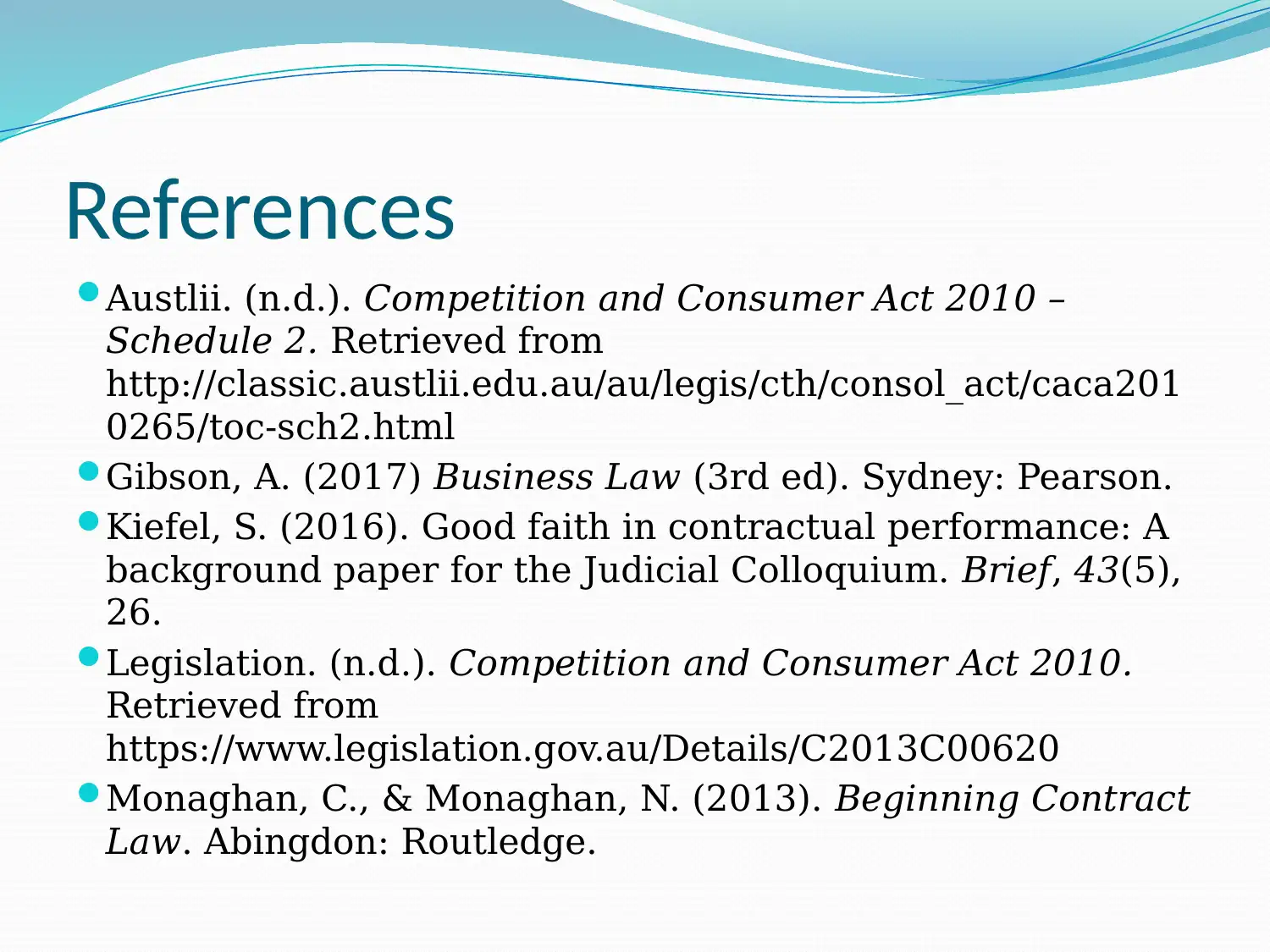
References
Austlii. (n.d.). Competition and Consumer Act 2010 –
Schedule 2. Retrieved from
http://classic.austlii.edu.au/au/legis/cth/consol_act/caca201
0265/toc-sch2.html
Gibson, A. (2017) Business Law (3rd ed). Sydney: Pearson.
Kiefel, S. (2016). Good faith in contractual performance: A
background paper for the Judicial Colloquium. Brief, 43(5),
26.
Legislation. (n.d.). Competition and Consumer Act 2010.
Retrieved from
https://www.legislation.gov.au/Details/C2013C00620
Monaghan, C., & Monaghan, N. (2013). Beginning Contract
Law. Abingdon: Routledge.
Austlii. (n.d.). Competition and Consumer Act 2010 –
Schedule 2. Retrieved from
http://classic.austlii.edu.au/au/legis/cth/consol_act/caca201
0265/toc-sch2.html
Gibson, A. (2017) Business Law (3rd ed). Sydney: Pearson.
Kiefel, S. (2016). Good faith in contractual performance: A
background paper for the Judicial Colloquium. Brief, 43(5),
26.
Legislation. (n.d.). Competition and Consumer Act 2010.
Retrieved from
https://www.legislation.gov.au/Details/C2013C00620
Monaghan, C., & Monaghan, N. (2013). Beginning Contract
Law. Abingdon: Routledge.
⊘ This is a preview!⊘
Do you want full access?
Subscribe today to unlock all pages.

Trusted by 1+ million students worldwide
1 out of 12
Related Documents
Your All-in-One AI-Powered Toolkit for Academic Success.
+13062052269
info@desklib.com
Available 24*7 on WhatsApp / Email
![[object Object]](/_next/static/media/star-bottom.7253800d.svg)
Unlock your academic potential
Copyright © 2020–2026 A2Z Services. All Rights Reserved. Developed and managed by ZUCOL.




